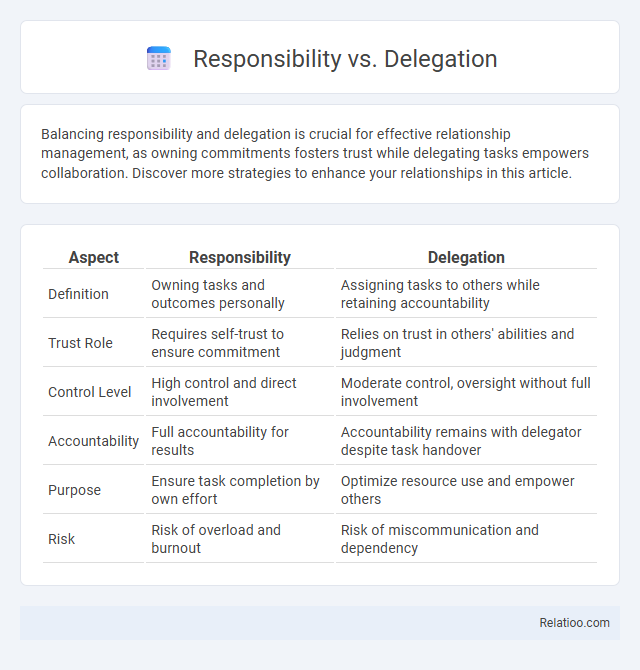Balancing responsibility and delegation is crucial for effective relationship management, as owning commitments fosters trust while delegating tasks empowers collaboration. Discover more strategies to enhance your relationships in this article.
Table of Comparison
| Aspect | Responsibility | Delegation |
|---|---|---|
| Definition | Owning tasks and outcomes personally | Assigning tasks to others while retaining accountability |
| Trust Role | Requires self-trust to ensure commitment | Relies on trust in others' abilities and judgment |
| Control Level | High control and direct involvement | Moderate control, oversight without full involvement |
| Accountability | Full accountability for results | Accountability remains with delegator despite task handover |
| Purpose | Ensure task completion by own effort | Optimize resource use and empower others |
| Risk | Risk of overload and burnout | Risk of miscommunication and dependency |
Understanding Responsibility in Leadership
Understanding responsibility in leadership involves recognizing the accountability leaders hold for decisions and outcomes within their team or organization. You must balance delegating tasks effectively while maintaining ownership of overall goals and ensuring delegated duties align with strategic objectives. Clear communication of expectations and consistent follow-up are essential to uphold responsibility without relinquishing leadership authority.
Defining Delegation in the Workplace
Delegation in the workplace involves assigning specific tasks or responsibilities to team members while maintaining overall accountability for the outcomes. Effective delegation enhances productivity by matching tasks with employees' skills and capacity, fostering professional growth and commitment. Clear communication and monitoring are essential to ensure delegated responsibilities align with organizational goals and performance standards.
The Key Differences Between Responsibility and Delegation
Responsibility refers to the obligation to complete a task and be accountable for its outcome, while delegation involves assigning that task to someone else while retaining overall accountability. The key difference lies in the control and accountability; responsibility cannot be transferred, but delegation allows distribution of workload under the leader's supervision. Effective delegation enhances productivity without diminishing the primary owner's responsibility for results and decision-making.
Why Responsibility Matters for Effective Teams
Responsibility ensures accountability and drives individual commitment, which is crucial for effective team performance. Delegation allows tasks to be distributed efficiently, but without clear responsibility, project outcomes can become unclear and goals unmet. Your team's success depends on a balance where responsibility is clearly assigned and embraced, fostering ownership and consistent results.
The Benefits of Delegation for Productivity
Delegation enhances productivity by allowing leaders to assign tasks based on team members' strengths, leading to faster and more efficient project completion. Sharing responsibilities prevents burnout and frees up time for strategic planning and higher-level decision-making. Empowering employees through delegation fosters skill development and increases overall team motivation and accountability.
Common Challenges in Balancing Responsibility and Delegation
Common challenges in balancing responsibility and delegation include maintaining accountability while distributing tasks effectively to ensure project success. You might struggle with trusting team members' capabilities, which can lead to micromanagement or incomplete delegation. Clear communication, setting expectations, and providing adequate support are essential to overcome these obstacles and enhance team performance.
How to Delegate Tasks Without Losing Control
Effective delegation involves assigning tasks while maintaining oversight through clear communication, defined expectations, and regular progress checks. Setting measurable goals and deadlines ensures accountability without micromanaging, allowing leaders to focus on strategic priorities. Utilizing project management tools and empowering team members fosters trust while retaining control over outcomes.
Signs of Over-Delegation and Its Risks
Signs of over-delegation include frequent loss of control over critical tasks, unclear accountability, and reduced team motivation due to excessive workload shifting. Your project outcomes may suffer from inconsistent quality, missed deadlines, and diminished trust within the team when responsibility is irresponsibly delegated. Understanding these risks helps balance responsibility and delegation to maintain productivity and team cohesion.
Strategies to Strengthen Personal Accountability
Strengthening personal accountability involves clearly defining roles and setting measurable goals, ensuring individuals understand their responsibilities without over-relying on delegation. Effective strategies include establishing transparent communication channels, providing consistent feedback, and fostering a culture where ownership of tasks is prioritized over shifting duties. Encouraging self-monitoring and reflection empowers individuals to take charge of outcomes while balancing delegation for optimized team performance.
Best Practices for Combining Responsibility and Delegation
Effective management balances responsibility and delegation by assigning clear ownership while empowering team members with appropriate authority. Best practices include defining specific roles, establishing accountability frameworks, and providing ongoing support to ensure delegated tasks align with overall objectives. This approach enhances productivity, fosters trust, and promotes skill development within the team.

Infographic: Responsibility vs Delegation
 relatioo.com
relatioo.com